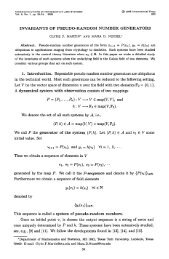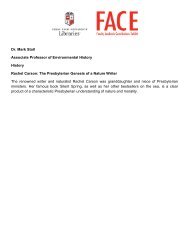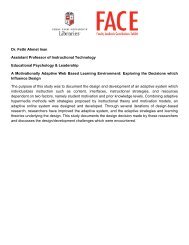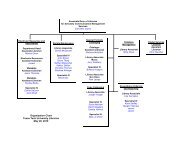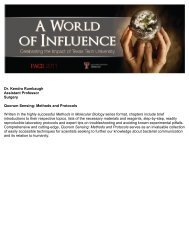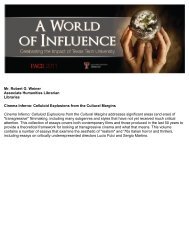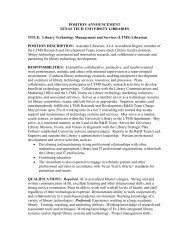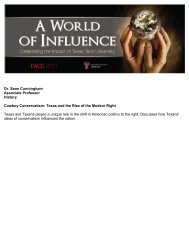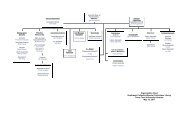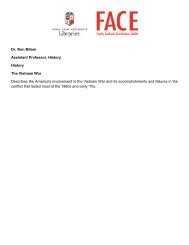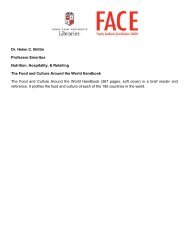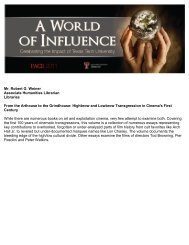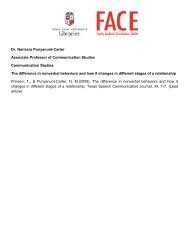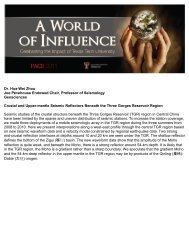Nonprofit Organizations Law and Policy Third Edition - Libraries ...
Nonprofit Organizations Law and Policy Third Edition - Libraries ...
Nonprofit Organizations Law and Policy Third Edition - Libraries ...
You also want an ePaper? Increase the reach of your titles
YUMPU automatically turns print PDFs into web optimized ePapers that Google loves.
16 OVERVIEW OF THE NONPROFIT SECTOR Cu. 1<br />
I. BACKGROUND<br />
BMR, Inc. is a nonprofit organization with a feminist orientation. Its<br />
purpose is "to create a channel of communication for women that would<br />
educate <strong>and</strong> inform them on general issues of concern to them." To this<br />
end, it publishes a monthly newspaper, Big Mama Rag (BMR), which<br />
prints articles, editorials, calendars of events, <strong>and</strong> other information of<br />
interest to women. BMR, Inc.'s primary activity is the production of that<br />
newspaper, but it also devotes a considerable minority of its time to<br />
promoting women's rights through workshops, seminars, lectures, a weekly<br />
radio program, <strong>and</strong> a free library. BMR, Inc. has a predominantly<br />
volunteer staff <strong>and</strong> distributes free approximately 2100 of 2700 copies of<br />
Big Mama Rag's monthly issues. Moreover, the organization has severely<br />
limited the quantity <strong>and</strong> type of paid advertising. As the district court<br />
found, BMR, Inc. neither makes nor intends to make a profit <strong>and</strong> is<br />
dependent on contributions, grants, <strong>and</strong> funds raised by benefits for over<br />
fifty percent of its income. * * *<br />
Because of its heavy reliance on charitable contributions, BMR, Inc.<br />
applied in 1974 for tax-exempt status as a charitable <strong>and</strong> educational<br />
institution. That request was first denied by the IRS District Director in<br />
Austin, Texas, on the ground that the organization's newspaper was<br />
indistinguishable from an "ordinary commercial publishing practice."<br />
After BMR, Inc. filed a protest <strong>and</strong> a hearing was held in the IRS National<br />
Office, the denial of tax-exempt status was affirmed on three separate<br />
grounds:<br />
1. the commercial nature of the newspaper; 2. the political <strong>and</strong><br />
legislative commentary found throughout; <strong>and</strong> 3. the articles, lectures,<br />
editorials, etc., promoting lesbianism.<br />
II. THE REGULATORY SCHEME<br />
Tax exemptions are granted under section 501(c) of the Internal<br />
Revenue Code to a variety of socially useful organizations, including the<br />
charitable <strong>and</strong> the educational. The Code forbids exemption of an organization<br />
if any part of its net earnings inures to the benefit of private<br />
persons or if it is an "action organization"-one that attempts to influence<br />
legislation or participates in any political campaign. Treasury regulations<br />
impose additional requirements: exempt status is accorded only to<br />
applicants whose articles of organization limit their activities to furtherance<br />
of exempt purposes (the "organizational test") or whose activities are<br />
in fact aimed at accomplishment of exempt purposes (the "operational<br />
test"). Treas.Reg. § 1.501(c)(3)-l(b) & (c) (1959).<br />
The Treasury regulations also define some of the exempt purposes<br />
listed in section 501(c)(3) of the Code, including "charitable" <strong>and</strong> "educational."<br />
The definition of "educational" is the one at issue here: The<br />
term "educational," as used in section 501(c)(3), relates to-<br />
(a) The instruction or training of the individual for the purpose<br />
of improving or developing his capabilities; or



